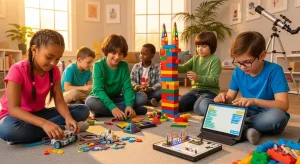In today’s hyperconnected world, digital literacy for kids is no longer optional—it’s essential. As screens become an integral part of education, entertainment, and communication, parents must ensure their children know how to navigate the digital world safely, responsibly, and intelligently.
This guide will walk you through the essentials of online safety for kids, including strategies for teaching kids about the internet, tools for screen time management, and how to instill digital citizenship for students.
Why Digital Literacy Matters for Kids
Digital literacy refers to a child’s ability to understand and use technology effectively and responsibly. It includes:
Evaluating online sources for credibility
Understanding digital privacy and security
Knowing how to behave respectfully online
Avoiding online scams and predators
Without proper guidance, children are vulnerable to cyber threats, cyberbullying, and exposure to inappropriate content. That’s where internet safety for children becomes a top priority.
AI in Autonomous Vehicles: Transforming the Future of Transportation
Top Risks Children Face Online
Understanding the dangers is the first step toward child online protection. Here are some key risks:
| Online Risk | Description |
|---|---|
| Cyberbullying | Harassment through digital platforms, which can harm self-esteem |
| Online Predators | Adults targeting children for exploitation through chat or social media |
| Inappropriate Content | Easy access to adult or violent media without filters |
| Scams & Phishing | Tricks to steal private info or gain access to devices |
| Excessive Screen Time | Can lead to sleep issues, addiction, and reduced physical activity |
Teaching Digital Literacy for Kids
1. Start Early and Keep It Age-Appropriate
You can begin teaching kids about the internet as early as age 5. Use simple language and examples like:
“Never talk to strangers online.”
“Always ask before clicking a new link or app.”
2. Explain Online Privacy Clearly
Kids need to understand the importance of keeping personal information private. Teach them:
Not to share full names, addresses, school names, or photos
To use strong, unique passwords
How to report inappropriate messages or contact
Debt Reduction & Budget Planning: A Practical Guide
Promoting Digital Citizenship for Students
Model Responsible Behavior
Kids imitate adults. Demonstrate:
Respectful commenting on social media
Critical thinking when reading online news
Balanced screen time management in your routine
Set Clear Rules & Expectations
Create a family media agreement. Outline when and where screens can be used and which apps or websites are allowed.
Best Tools for Child Online Protection
Here are some apps and tools to help monitor and secure your child’s online experience:
Qustodio – Real-time activity tracking and screen time control
Bark – Monitors social media, text messages, and content alerts
Google Family Link – Manage apps and screen usage on Android devices
Net Nanny – AI-powered web filtering and parental control
Building a Strong Hybrid Work Culture in 2025
Tips for Managing Screen Time Effectively
To promote healthier digital habits, implement the following:
Set a timer: Allow fixed screen time per day (e.g., 1-2 hours)
Use rewards: Offer screen time as a reward for chores or reading
Tech-free zones: Ban screens during meals and before bed
Balance with offline activities: Encourage play, reading, and outdoor time
FAQ: Digital Literacy & Online Safety for Kids
1. At what age should kids learn about internet safety?
Children as young as 5 can start learning the basics of online safety for kids through age-appropriate discussions and guidance.
2. What is digital citizenship and why is it important?
Digital citizenship for students refers to responsible online behavior, including respect, privacy, and safe interactions. It helps kids grow into thoughtful, ethical digital users.
3. How can I protect my child from online predators?
Monitor their online activity, use parental controls, and teach them to never share personal info or respond to strangers online. Keep communication open and non-judgmental.
Debt Reduction & Budget Planning: Your Step-by-Step Guide
Final Thoughts: A Shared Responsibility
In 2025 and beyond, the digital world will only grow more complex. By actively participating in your child’s online life, teaching them the principles of digital literacy, and ensuring internet safety for children, you empower them to thrive—not just survive—online.










